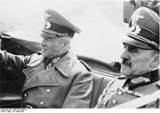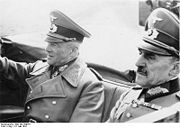
Otto von Stülpnagel
Encyclopedia

Germany
Germany , officially the Federal Republic of Germany , is a federal parliamentary republic in Europe. The country consists of 16 states while the capital and largest city is Berlin. Germany covers an area of 357,021 km2 and has a largely temperate seasonal climate...
military commander of France
France
The French Republic , The French Republic , The French Republic , (commonly known as France , is a unitary semi-presidential republic in Western Europe with several overseas territories and islands located on other continents and in the Indian, Pacific, and Atlantic oceans. Metropolitan France...
during the Second World War.
Born 16 June 1878 in Berlin, Otto von Stülpnagel pursued a military career in keeping with his family’s long tradition of military service. Commissioned in 1898 and accepted as a member of the Imperial General Staff, he received several decorations for distinguished service on the western front during World War One. Nominated for the Pour le Merité, Stülpnagel survived personnel cuts mandated by the Treaty of Versailles. Dismayed by accusations of German atrocities, he published an angry defence of German military conduct in a popular book entitled The Truth about German War Crimes in 1921. Promoted to the rank of Colonel (Oberst) in 1925 and Lieutenant General (Generalleutnant) in 1931, Stülpnagel played a leading role in the Reichswehr in conjunction with Kurt von Schleicher and Freiherr von Bussche during the Weimar era. Transferred to the fledgling German air force in 1934, Stülpnagel eventually took charge of the air force academy before falling from favor and retiring in March 1939.
Days before the German invasion of Poland, Hitler recalled Stülpnagel to active service and placed him in charge of a military district in Austria (Wehrkreise XVII), and he held the latter post for fourteen months. On 25 October 1940, German army high command transferred Otto von Stülpnagel to France and placed him in charge of a military government with the title of Military Commander in France (Militärbefehlshaber in Frankreich or MBF). Not without controversy, this last assignment defined Stülpnagel’s career.
Orders from Hitler placed the army and the MBF in charge of “security” but allowed other state and Nazi party agencies to exercise a degree of influence in Occupied France. The German ambassador in Paris, Otto Abetz, first supervised and later controlled diplomatic relations between France and Germany, but the power amounted to little in practice. Hitler would not allow his ambassador to trade concessions for French cooperation, and formal negotiations between the Third Reich and Vichy regime came to naught. Able to control the flow of vital raw materials, food, and people across the demarcation line that separated occupied from unoccupied France, Stülpnagel could reward French cooperation by allowing people and goods to cross military checkpoints, or he could seal the borders and bring the French economy to a grinding halt. Control over both the demarcation line inside France and borders with Germany and Belgium gave the MBF considerable influence over German policy and French affairs. Otto von Stülpnagel played a major role in Franco German relations between October 1940 and January 1942.
Determined to support the Nazi war effort by placing French industrial resources at the disposal of the German war economy, Stülpnagel discouraged all activities that did not advance the German war effort. The latter goal placed him at loggerheads with Nazi party stalwarts who viewed the Second World War as a struggle against Jews and their alleged communist allies. Days after German troops occupied Paris, agents of the Einsatz Reichsleiter Alfred Rosenberg and diplomats attached to the German embassy in Paris began to confiscate the art collections of prominent French Jews. Upset by the apparent seizure of France’s artistic patrimony, the French government complained to German diplomats and the MBF. Eager to maintain cordial relations with the Vichy regime, Stülpnagel and his staff condemned the confiscations though a series of protests that eventually reached Hitler’s desk, but to no avail. Hitler eventually placed the Einsatzstab Reichsleiter Rosenberg beyond military control and sanctioned the wholesale robbery of Jewish art collections.
Conflict with the SS followed a similar pattern. Forced to accept an advisory role at the start of the Occupation, Himmler’s SS highlighted the alleged danger of the so-called ‘Jewish menace’ and pressed military authorities to launch an active campaign against racial opponents in France, but SS forces in France lacked the authority to act independently. After resistance groups shot Colonel Karl Friedrich Hotz in Nantes on 20 October and Dr. Hans-Gottfried Reimers in Bordeaux on 21 October 1941, Hitler ordered the Otto von Stülpnagel to execute 100-150 French hostages for each attack. The MBF immediately condemned Hitler’s policy through official channels, treated both attacks as a single incident, and shot a total of 98 hostages. Determined to preserve French cooperation, Stülpnagel condemned large-scale executions. In contrast, the SS demonstrated its enthusiasm for Hitler’s war against the so-called Jewish conspiracy by bombing seven Synagogues in Paris on the night of 2/3 October 1941. Embarrassed by the attacks, Stülpnagel complained to superiors in Berlin, but his repeated protests only reiterated tepid support for Nazi racial policy.
Suspecting the MBF of Francophilia, Field Marshal Wilhelm Keitel, the head of Armed Forces High Command (Oberkommando der Wehrmacht or OKW) grew tired of Stülpnagel’s complaints. On 2 February 1942, he directed the MBF to answer all acts of resistance with “sharp deterrents, including the execution of a large number of imprisoned communists, Jews, or people who carried out previous attacks, and the arrest of at least 1,000 Jews or communists for later evacuation.”
Unwilling to carry out mass executions, Otto von Stülpnagel promptly submitted a bitter letter of resignation. Succeeded by his cousin Carl-Heinrich von Stülpnagel
Carl-Heinrich von Stülpnagel
Carl-Heinrich von Stülpnagel, was a German general and a member of the July 20 Plot to assassinate Adolf Hitler.-Early life:...
, Otto may have suffered a nervous breakdown and spent the remainder of the war with his wife in Berlin. Arrested by Allied authorities after Germany’s surrender, the former MBF wound up in a French military prison. Condemned as a butcher in the press and charged with war crimes by French authorities, Otto von Stülpnagel committed suicide in Cherche Midi Prison on 6 February 1948.

